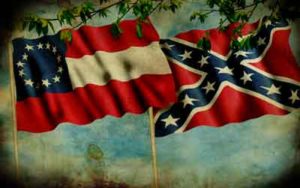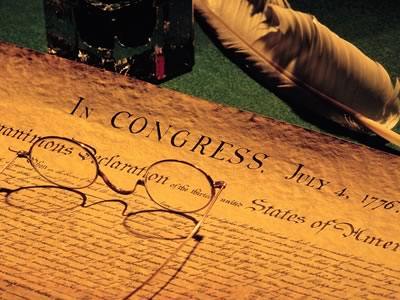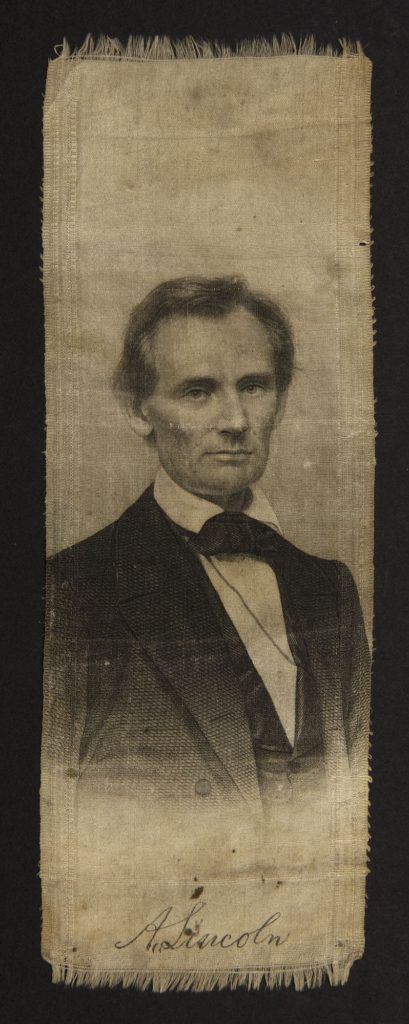These Do Not Mean What You Think They Do.
 By April of 1775 the tensions between the Colonies and the Crown had reached a breaking point, and when the Kings men arrived at Lexington and Concord to confiscate the arms stored there they were met with locals who had grabbed whatever guns they had and assembled to prevent the Redcoats from taking their cache of arms. So it was that on that early April morning, just as the sun was rising, that America’s War for Independence began. So it was that on that early April morning a ragtag group of farmers, shopkeepers and merchants faced off against 500 of the most well trained and disciplined fighters on the planet. So it was that on this early April morning, that although these men were technically committing treason, they would go down into history books as patriots and heroes.
By April of 1775 the tensions between the Colonies and the Crown had reached a breaking point, and when the Kings men arrived at Lexington and Concord to confiscate the arms stored there they were met with locals who had grabbed whatever guns they had and assembled to prevent the Redcoats from taking their cache of arms. So it was that on that early April morning, just as the sun was rising, that America’s War for Independence began. So it was that on that early April morning a ragtag group of farmers, shopkeepers and merchants faced off against 500 of the most well trained and disciplined fighters on the planet. So it was that on this early April morning, that although these men were technically committing treason, they would go down into history books as patriots and heroes.
Why is that?
I’m certain that some of you have heard the saying that, “To the victor go the spoils.” Well, there is another lesser known saying that I’d like to share with you, “History is written by the victors.” I know that Winston Churchill said this, but someone else said something very similar long before Churchill ever uttered those words. In the year 1864, Major General Patrick Cleburne, of the Confederate States of America said the following, “Every man should endeavor to understand the meaning of subjugation before it is too late… It means the history of this heroic struggle will be written by the enemy; that our youth will be trained by Northern schoolteachers; will learn from Northern school books their version of the war…”
Two wars, less than a century apart, both with distinctly similar characteristics; and in one those who stood up to their government are viewed as patriots and heroes, and the other they are viewed as traitors and their cause scorned and ridiculed by those alive a century and a half later. What is the difference between the two which causes people to view them differently? Well it’s simple, in one instance those who stood up to their government prevailed, and in the other they were defeated.
What do you know about the Civil War; and more importantly, how did you come into possession of this knowledge? Did you learn what you know from a few chapters in a history book from back when you were in school? Did you learn it from some TV documentary or film?
How do you know that you are in possession of the truth? You might believe that you are in possession of the truth, but that is only because you refuse to accept evidence which proves that what you have been told or taught is a lie. If you could put aside your emotions over the issue of slavery and examine the facts, you would see that there was more to the Civil War than just the institution of slavery.
Are you aware that 15 months passed from the time the first shots of the American Revolution were fired before the delegates to the Second Continental Congress voted for and adopted the Declaration of Independence? Are you aware that when the delegates to the Continental Congress adopted the Declaration of Independence there were more slaves in the Colony of New York than there were in any individual Colony in the South? Are you aware that Confederate General Robert E. Lee emancipated his slaves before the Civil War, but that Union General and future President Ulysses S. Grant kept his until he was forced to free them by the 13th Amendment? Are you aware that many a prominent New England family grew quite wealthy off the profits they made transporting slaves from Africa to be sold in the slave markets up and down the New England coast? Are you aware that when Thomas Jefferson wrote his original draft of the Declaration of Independence he blamed the King of England for the institution of slavery, saying, “…he has waged cruel war against human nature itself, violating it’s most sacred rights of life & liberty in the persons of a distant people who never offended him, captivating & carrying them into slavery in another hemisphere, or to incur miserable death in their transportation thither.”
No, you probably were not aware of these things; simply because they were not in your history books or in the films and documentaries you’ve watched on the Civil War. Now tell me again how you think you know the whole story regarding the Civil War!

Anthony Johnson
Let me tell you another story; something else you probably did not learn in your history class. In your studies, did the name Anthony Johnson ever pop up? Anthony Johnson was an Angolan who was captured by a neighboring tribe and sold to Arab slave traders. He eventually was sold to a merchant in the employ of the Virginia Company; a British company whose primary interest was in establishing profitable colonies in the Americas.
In 1621 Johnson arrived in Virginia and was sold to a planter named Bennett to work on a tobacco plantation as an indentured servant. Now it is at this point that I would like to differentiate between an indentured servant and a chattel slave. An indentured servant can work their servitude off over the course of time; typically depending upon the cost paid for them versus the work they perform for the person they are sold to. A chattel slave, on the other hand, while they may be freed, is not guaranteed freedom; no matter how long they serve in bondage. A chattel slave may live and die their entire life in bondage; never knowing freedom.
Sometime prior to 1647 Johnson, and another slave named Mary he had married, obtained their freedom; as the records from 1647 list him as a free negro when he purchased a calf in that year. When Johnson paid off his indentured servitude he was granted 250 acres of land under the headright system; a program in which former indentured servants were granted land to work for themselves. Johnson obtained his land when he purchased the contracts of five other indentured servants; four of which were white.
In 1654, after one of his indentured servants had signed another contract of indenture with another farmer, Johnson sued to get his slave back. The court originally ruled in favor of the other farmer, Robert Parker, but Johnson appealed and the ruling was overturned; marking it the first time that a court of the New England Colonies had held that a person could be held in servitude for life; and owner of the slave was a black man.
I tell you this because many of the people I know who take offense at the images and personages who represent the Confederacy believe that slavery was solely a white crime against blacks. If you were to dig you would find that there are many instances of freed slaves turning around and purchasing slaves of their own. Justus Angel and Mistress L. Horry are perfect examples of blacks owning slaves. These two lived in what is now Charlestown, South Carolina, and between them they owned 168 slaves. Then there was C. Richards of New Orleans who ran a sugar plantation. She was a black woman who owned 152 slaves. Then there is the Pendarvis family of South Carolina, also black, who ran a rice farm in South Carolina who owned 123 slaves.
I’m not for a minute trying to justify slavery; I’m only attempting to show you that it was not solely a white on black crime and if your attitude towards the Confederacy is based solely upon slavery you may want to rethink your position.
Are you also aware that 3 years before our Constitution was written, and the issue of slavery in America brushed under the carpet for posterity to deal with, that Thomas Jefferson suggested gradual emancipation of the slaves; training them in skills and then colonizing them outside the United States?
Now you may find this prejudiced, but Jefferson had his reasons for wanting to colonize them outside the U.S. In his Notes on the State of Virginia Jefferson states, “It will probably be asked, Why not retain and incorporate the blacks into the state, and thus save the expence of supplying, by importation of white settlers, the vacancies they will leave? Deep rooted prejudices entertained by the whites; ten thousand recollections, by the blacks, of the injuries they have sustained; new provocations; the real distinctions which nature has made; and many other circumstances, will divide us into parties, and produce convulsions which will probably never end but in the extermination of the one or the other race.”
Now you may find that to be racist, and I won’t hold it against you if you do. But consider this, Abraham Lincoln also considered numerous plans to colonize the black slaves outside the United States.
A couple other facts you probably weren’t taught in history class. The day before Lincoln issued his Emancipation Proclamation he affixed his name to a contract with an unscrupulous venturer named Henry Knox, (no relation to the General who fought under the command of George Washington during the Revolution), who planned to colonize 5,000 black men, women and children to an island off the coast of Haiti. Although nothing came of it, it shows that Lincoln too considered colonizing them instead of allowing them to remain in the United States.
In fact, both Lincoln and Jefferson felt that there were distinct differences between the white and black man and that in some ways the black man could never be equal to the white. I cannot quote the entire comments Jefferson makes regarding the difference between the two races, but they are easily found if you do a web search for Notes on the State of Virginia, Query 14; but be forewarned, Jefferson’s comments are rather lengthy. Abraham Lincoln, on the other hand, was more pithy, “I will say then that I am not, nor ever have been in favor of bringing about in any way the social and political equality of the white and black races, that I am not nor ever have been in favor of making voters or jurors of negroes, nor of qualifying them to hold office, nor to intermarry with white people; and I will say in addition to this that there is a physical difference between the white and black races which I believe will forever forbid the two races living together on terms of social and political equality. And inasmuch as they cannot so live, while they do remain together there must be the position of superior and inferior and I as much as any other man am in favor of having the superior position assigned to the white race.”
Again, do not construe my showing Lincoln’s comments while refraining from showing Jefferson’s as an attempt to paint Lincoln in a bad light. I did so only because Lincoln’s comments fit into a single paragraph and Jefferson’s would have taken up several pages. Both felt similar towards the differences between blacks and whites; yet it is Lincoln and his war to end slavery that you are taught in school, when there was much more to it than just the fate of the institution of slavery at stake.
 When the finalized draft of the Declaration of Independence was presented to the Second Continental Congress, the words penned by Jefferson, and edited and amended by a committee which included John Adams and Ben Franklin, were first heard by the delegates who would decide the course the Colonies would take; reconciliation with the Crown, or a complete and total severance of all ties which bound them to the authority of the King and Parliament.
When the finalized draft of the Declaration of Independence was presented to the Second Continental Congress, the words penned by Jefferson, and edited and amended by a committee which included John Adams and Ben Franklin, were first heard by the delegates who would decide the course the Colonies would take; reconciliation with the Crown, or a complete and total severance of all ties which bound them to the authority of the King and Parliament.
The Declaration of Independence may rightly be called the birth certificate of the United States; as prior to it being voted upon and adopted the Colonies were still holdings of the Crown; and it wasn’t until they adopted what that document says, and then paid for the principles it contains with 7 years of war, that America became a nation unto itself.
The Declaration of Independence states that governments derive their just authority from the consent of the governed. Unless you are over the age of 104 there is not an American alive today who has lived when our government represented both the people and the States as co-equal partners in the legislative authority. Sure, they go by the name of State Senators, but they are chosen by the people and therefore do not represent the State as a sovereign entity.
The Declaration of Independence also states that “…whenever any Form of Government becomes destructive of these ends, it is the Right of the People to alter or to abolish it, and to institute new Government…” While this may not say that the States retain the right to remove themselves from the Union created by the Constitution, a look at the thoughts of the person who penned the Declaration of Independence may show that this concept was accepted as being the right of any State. In his first Inaugural Address, President Thomas Jefferson states, “If there be any among us who would wish to dissolve this Union or to change its republican form, let them stand undisturbed as monuments of the safety with which error of opinion may be tolerated where reason is left free to combat it.”
In fact, just a bit over a decade prior to the onset of the Civil War, a young politician stood on the floor of the House of Representatives and made the following comments, “Any people anywhere, being inclined and having the power, have the right to rise up and shake off the existing government and form a new one that suits them better. This is a most valuable, most sacred right- a right which we hope and believe is to liberate the world. Nor is this right confined to cases in which the whole people of an existing government may choose to excercise it. Any portion of such people that can, may revolutionize and make their own, of so much territory as the inhabit.” The name of this young politician is Abraham Lincoln.
When the Southern States seceded from the Union they did so with the greatest of reluctance. They did not take the decision to leave the Union any less lightly than our Founders took the decision to sever the ties which bound them to the Crown. Yet they believed, as did our Founders, “…when a long train of abuses and usurpations, pursuing invariably the same Object evinces a design to reduce them under absolute Despotism, it is their right, it is their duty, to throw off such Government, and to provide new Guards for their future security.”
 When the Southern States declared their independence from the Union, Abraham Lincoln violated the Constitution by calling for an army of 75,000 to be raised to invade these States in rebellion against the authority of the government of which he was the head of.
When the Southern States declared their independence from the Union, Abraham Lincoln violated the Constitution by calling for an army of 75,000 to be raised to invade these States in rebellion against the authority of the government of which he was the head of.
That right there is the cause of the Civil War, the fact that Abraham Lincoln sought to retain the control exercised by the government over the component parts of the Union, and any who threatened to leave this Union would be dealt with by force. The South sought no conquest or riches, they sought only to be left alone to govern themselves as they saw fit. The South did not invade the North, the North invaded the South.
In fact, it wasn’t until Lincoln’s call for 75,000 volunteers that Virginia chose to secede. Governor Letcher’s response to Secretary of War Simon Cameron states, “Your object is to subjugate the Southern States, and a requisition made upon me for such an object — an object, in my judgment, not within the purview of the Constitution or the act of 1795 — will not be complied with. You have chosen to inaugurate civil war, and having done so, we will meet it in a spirit as determined as the Administration has exhibited towards the South.”
Let us now consider what I’ve discussed. In 1776 thirteen colonies decided that they had suffered enough under their government and they chose to declare their independence. Eighty five years later the legislatures of 11 States decided that they had suffered long enough under the oppression of their government and sought their independence.
The Crown sought to retain possession of their Colonies just as Abraham Lincoln sought to retain control over the 11 seceded States. If you believe that Lincoln began this war to free the slaves held in the Southern States, you better review your history. In his Inaugural Address Lincoln states, “I have no purpose, directly or indirectly, to interfere with the institution of slavery in the States where it exists. I believe I have no lawful right to do so, and I have no inclination to do so.”
In his letter to Horace Greeley, Lincoln states, “I would save the Union. I would save it the shortest way under the Constitution. The sooner the national authority can be restored; the nearer the Union will be “the Union as it was.” If there be those who would not save the Union, unless they could at the same time save slavery, I do not agree with them. If there be those who would not save the Union unless they could at the same time destroy slavery, I do not agree with them. My paramount object in this struggle is to save the Union, and is not either to save or to destroy slavery.”
Even his esteemed Emancipation Proclamation only freed the slaves in the areas he held no authority; the areas in the seceded States still under control of the Confederacy. It did nothing to free the slaves in areas held by Union Forces or those held in bondage in Northern States.
If the Civil War was fought over slavery, why didn’t Lincoln come out and say so directly; why the effort to say that slavery was not his reasons for engaging in war against those States which had exercised the same prerogative as had our Founders, and which he himself had espoused 13 years earlier as a member of the House of Representatives?
The war itself was fought because the government of the United States raised an army and invaded the sovereign and independent Confederate States of America. It matters not what their reasons were for seceding, the fact is that they left the Union in peace and it was the North who initiated hostilities against them.
In his book Battle Cry of Freedom: The Civil War Era, author James McPherson tells of “A single ragged Confederate who obviously didn’t own any slaves was asked by a group of Yankee soldiers why he was fighting. The Rebel responded, I’m fighting because you are here.”
That is why the Civil War was fought, because the North invaded the South; an act of war by one sovereign nation against another. You can say what you will about their reasons for leaving the Union, but if you believe in the Declaration of Independence and what it stands for, then you MUST accept that the South had the right to sever ties with the Union and form their own system of government.
That is why Jefferson Davis never stood trial for treason against the United States, because the government could never allow the question of a States right to secede be put to the test of a trial by jury; for it was still held that it was a State’s right to do so and the North would have then been forced to shoulder the blame for the death of over half a million people and millions in devastation and destruction.
Whether or not you choose to accept these facts, as I have presented them to you, is entirely up to you. But know this, the only difference between our American Revolution and the Civil War is that in our revolution those fighting for freedom and independence won, and in the Civil War those fighting to subjugate and oppress won. That’s the only difference, and the sooner you realize that you can move on and realize that no American has truly been free since Lee surrendered to Grant at Appomattox.
November 15, 2017
 ~ The Author ~
~ The Author ~
Neal Ross, Student of history, politics, patriot and staunch supporter of the 2nd Amendment. Send all comments to: bonsai@syix.com.
If you liked Neal’s latest column, maybe you’ll like his latest booklet: The Civil War: (The Truth You Have Not Been Told) AND don’t forget to pick up your copy of ROSS: Unmasked – An Angry American Speaks Out – and stay tuned – Neal has a new, greatly expanded book coming soon dealing with the harsh truths about the so-called American Civil War of 1861-1865. Life continues to expand for this prolific writer and guardian of TRUE American history.

Some inkling of the actual “…inclination(s)” of President Lincoln’s are, not only his own words – ever a clear indicator of a person’s “line of thinking” at any particular time; which are, of course, subject to change on any subsequent day – but those inclinations are also indicated in:
The design of the chair, or throne, his larger than life statue sits upon in The Lincoln Memorial. That statue has Lincoln’s hands resting on bundles of wrapped sticks, known as “fasci” – the very same symbol on a “Roosevelt dime” – from whence the word “fascist” (a word with a particular meaning to Benito Mussolini – is derived.